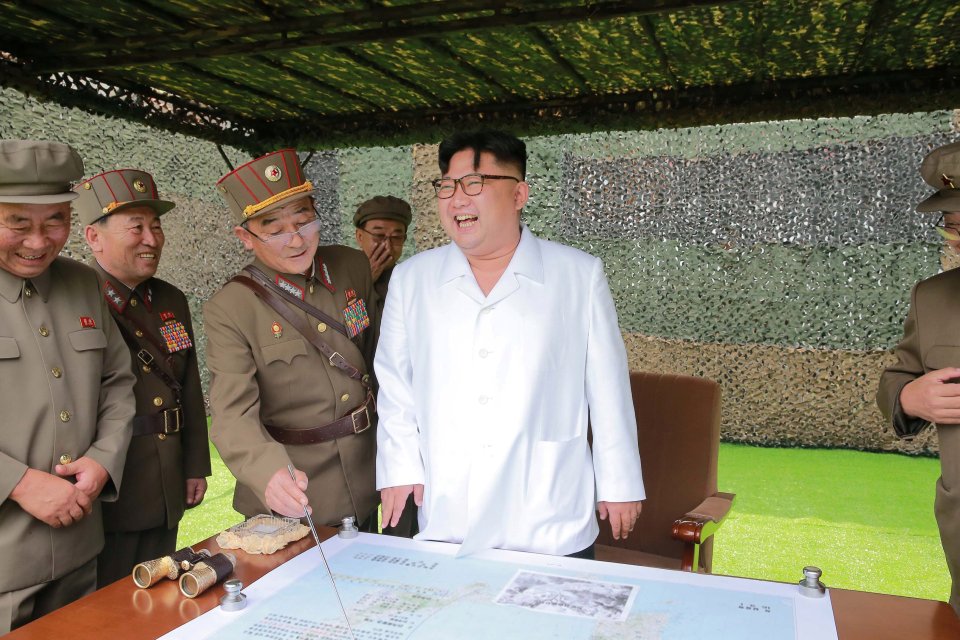When Kim Jong-Un makes an appearance surrounded by his generals, the world should expect an interesting news. Then, he laughs out loud and you know that his country’s missile arsenal has a new and more terrifying addition.
In this case, South Korea should be careful and Japan must review its safety conditions.
Evidently, all countries will shift attention towards the master of the White House, the only one capable of restraining the North Korean leader, if he intended to carry on his threats.
Kim Jong-Un might sometimes appear as a reckless young man playing at the edge of the abyss. He is tempted to play with the famous US boxer.
Missile and nuclear blackmail has already provided his country with revenues and aid. The current chaos in the big league provokes him to take over the big screen and escalate provocations.
Kim believes in the doctrine of his father and grandfather. He is a ruler undeterred by poverty rates or number of people dead due to famine. Criticism by organizations or newspapers is not welcomed in his country.
Collision with the outside world is beneficial for his regime’s unity. The beloved leader doesn’t fear UN Resolutions or pleas made by its members. There is no need to be worried about the Council unless the big powers agreed and a US-General sponsored execution began, which is unlikely and inconceivable currently.
This time, Kim went too far. He said that all of the US territories are within the missile range, any time and any place, adding that Washington’s war threat justifies North Korea’s desire to develop nuclear weapons. He disregarded US threats and criticism, and Chinese and Russian advice.
The North Korean leader probably realizes the club of great powers is in crisis, which is preventing it from issuing a unified resolution to halt his capabilities of disturbing his neighbors and the world.
The North Korean defiance bothered US President Donald Trump. This is a new challenge to his country’s image and blatant test to his personal image. Trump surpassed his previous reservations and directly criticized China for not doing anything concerning North Korea’s violations, despite being the country most capable of pressuring Kim and his regime.
There is no sign of anything good happening.
The following day, Chinese President Xi Jinping exhibited the troops participating in a military parade organized by People’s Liberation Army soldiers. This is the first parade of its kind since 1949, and the president made sure to attend the ceremony, sending more than a message.
Many linked this to a possible escalation in the Korean file and the tensions in the South China Sea.
Such a scene could have not been a source of concern had relations between Washington and Moscow been normal or semi-normal.
Truth is that these relations have been witnessing a new deterioration which suggests that any bridge-building is unlikely on the short run.
The US Senate imposed new sanctions on Russia, to which Moscow responded by asking Washington to reduce its diplomatic representation, hinting it would take stronger measures if the US proceeded with its current policy.
Prior to entering the White House, Trump dreamt of reestablishing relations with Russia. Vladimir Putin was looking forward to normalizing ties, which technically mean ending sanctions issued after Russia took Crimea and destabilized Ukraine, in addition to admitting Russia’s new international position especially after its military intervention that changed the course of developments in Syria.
The US Senate didn’t settle with the new sanctions, it was as if it had tied the President’s hands to lift off the sanctions. The sanctions are highly welcomed especially after security agencies confirmed that Russian hackers intervened in the US elections.
The deterioration of US-Russian relations is not good news for Middle Eastern countries, which are witnessing a bloodshed that is more alarming than the international political tension.
Before such deterioration, an assumption prevailed that the Syrian crisis might consolidate Russian-US cooperation in countering terrorism and containing the spread of the fire raging in Syria.
Washington recently conveyed a message that it is no longer concerned with the departure of President Bashar al-Assad, not for the time being at least. The US is wiling to accept a Russian Syria if it guarantees that Iranian Syria wouldn’t be established.
After the recent deterioration in US-Russia relations, countries in the Middle East should wonder how it will reflect on the region and the Syrian crisis. Some even believe that with more tension, Moscow would enhance its relations with Iran, making it more difficult to curb new Iranian missile tests, in addition to its policy of (committing) violations in the region.
Such deterioration could create additional complications in other areas especially if the current crisis in Venezuela became a bloody mess.
Sanctions are damaging Russia’s economy, which are already affected by oil prices. Some believe that Moscow will not hesitate to bring up the Ukrainian issue again to heighten European fears from US sanctions.
This is a difficult strain in relations among the club of great powers. A bloody and deadly crisis in the Middle East. There isn’t a new international system within reach or a regional system in the making.
Countries of the Middle East will have to swim across its old and current crises as well as the huge international chaos.
